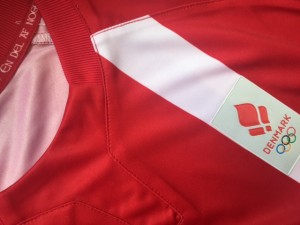News
Rio 2016 rundown: Today’s Olympic action (Day -1)
This article is more than 9 years old.
The Danish football team is up first tonight at 18:00

Denmark take on Iraq tonight (photo: DBU)
The Olympic Games in Rio may not officially begin until the extravaganza of the opening ceremony on Friday night (at 00:55 Danish time – Friday is Day 0 by the way), but it has actually already kicked off. Literally.
The women’s football started yesterday and today it will be the men’s turn to get the ball rolling, with the Danes involved against Iraq in the first game of the day at 18:00. The match will be shown on TV2.
Denmark, which qualified for the Olympics thanks to their semi-final appearance at the Under-21 European Championships last year, has turned up with a completely different squad from the one that qualified.
Alas, because the competition is not on the co-ordinated international calendar of FIFA, clubs can refuse to allow players to join their nations’ Olympic teams. And because club and European competitions have already begun, or are on the cusp of starting, across Europe, clubs are reluctant to let their players go.
READ MORE: Danish Olympic football side face losing the Fischer king
Watered-down version
For the Danes, this issue has been a particular problem. Of the 18 players on the Danish Olympic Squad, just five have played over ten under-21 games for Denmark.
Gone are the likes of Jannik Vestergaard (Borussia Mönchengladbach), Jores Okore (Aston Villa), Pierre Emile Højbjerg (Southampton), Victor Fischer (Middlesbrough), Riza Durmisi (Betis), Nicolai Thomsen (Nantes), Andreas Christensen (Borussia Mönchengladbach), Yussuf Poulsen (RB Leipzig), Frederik Sørensen (Verona) and Lasse Vigen Christensen (Fulham), who have a combined 162 under-21 caps between them and play in top European leagues.
In fact, just two of the players who helped get Denmark to the tournament are in the squad: Jens Jønsson (AGF) and Nicolai Brock-Madsen (Birmingham).
Instead, the team in Rio is made up of 13 players from the Danish leagues – including one from second tier side Fredericia – and four of the five who play abroad are the three over-23 players permitted. It will be an uphill battle for the Danes, even against Iraq, which finished fourth at the under-20 World Cup in 2013.
Other match-ups of interest tonight include Mexico vs Germany, Portugal vs Argentina, Sweden vs Colombia and Nigeria vs Japan.
Denmark vs Iraq, 18:00 on TV2










































